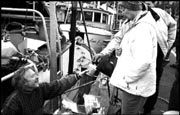HERE IS PETE KNUTSON, protesting. “Try some smoked salmon,” he tells a customer, holding out a plate of fish.
No window smashing or firebombing. The commercial fisher is selling his fish commercially. What makes it a rebellious act is that he’s doing it this chilly morning aboard his 40-foot gillnetter, moored at the West Wall of Fishermen’s Terminal, which is run by the Port of Seattle. And the Port has a policy. Fresh fish sold from boat, fine. Processed fish, nein.
“It’s my stock,” says the busy Knutson, 50, a longtime fisher and community college anthropology instructor who delights in being a thorn in the Port’s backside. He hands a customer $49 worth of boneless sockeye. “So why can’t I sell it?”
Because, says Port spokesperson Mick Shultz, there’s a rule.
“You can sell dressed fish,” Shultz says, meaning fresh and boat-frozen fish, cleaned and gutted, which fishers have peddled for years at the terminal. “But not processed fish.” That’s smoked, filleted, or de-headed fish, for example, he says.
IF FISHERS ARE ALLOWED to peddle such product from their boat, says Shultz, “that could turn the terminal into less of an industrial center and more of a retail and tourism center, and that’s not what the terminal is supposed to be.” The Port recently instructed Knutson and others by letter to discontinue their sales.
“It appears we’ve called their bluff,” says Knutson as a small line of customers forms alongside his boat, some of them tourists itching for a free sample of smoked sockeye. Other boats are tied up nearby selling shrimp and salmon. Knutson considers the sales a way to make an off-season buck or twenty. The Port may see it as an unnatural act, he says, but, “It’s not like we’re selling cotton candy and Cracker Jacks.”
Their selling does compete with a retail fish market nearby, which rents space from the Port. But this day’s boat sales, by drawing more shoppers to the terminal, seem to benefit the crowded store as well.
Of course, the protest sale is part of a bigger feud between the fishers and the Port over development philosophies and deteriorating facilities at the historic, 89-year-old terminal (see “Stormy Port,” Nov. 15, 2001). Fishers complain of rising costs and falling services at a facility that needs $25 million in repairs. They also suspect that the Port wants to ring the working harbor with condos and change its nature to an upscale marina. The Port calls those suspicions fish stories, and says the Interbay terminal will remain primarily a fish-boat haven.
But as if to intentionally continue this long-running grudge, the Port and fishers seemed to have now switched positions. Last year the fishers were worried that the Port—by allowing “yachts” (recreational boats) to moor there—was destined to turn the place into a touristy San Francisco-style Fisherman’s Wharf. Today the Port worries that the expanded fish sales could turn it into Disneyland.
IN TRUTH, THE REC-BOAT threat so far has not been the disaster fishers predicted—nor the success the Port hoped. As of last week, 27 pleasure boats had moved into the 371-slip facility, taking up otherwise vacant berths and living peacefully amid the trollers, trawlers, and tenders. At least eight of the “yachts” belong to fishers, says the Port.
The untrusting Knutson says fishers have to keep their guard up nonetheless. Rec boats can still be the beginning of a sea change for the terminal, and he and his fighting fishers rarely leave the parapets: They let the Port know they would defy the fish-sale policy, for example, by inviting Port commissioners to stop by for samples.
None showed. And spokesperson Shultz says the Port doesn’t plan to send in the troops to halt Knutson’s processed-fish sales. “We all need to talk,” he says.
Knutson’s agreeable. All he needs now is the time. His sales have been “phenomenal,” he says. As the buyer line grows even longer this morning, he tells a satisfied customer, “Come back again. We’re here every weekend.”









